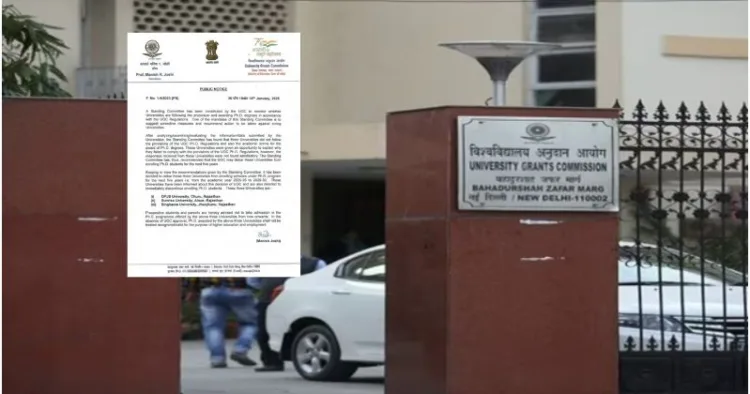In a decisive move to uphold academic standards, the University Grants Commission (UGC) on Thursday barred three Rajasthan-based universities from admitting students into their PhD programs for the academic years 2025-26 to 2029-30. The affected institutions are OPJS University, Churu; Sunrise University, Alwar; and Singhania University, Jhunjhunu.The regulatory body stated that the universities had failed to comply with its stringent PhD regulations, which include guidelines on admission procedures, coursework, faculty qualifications, and the evaluation process for awarding doctoral degrees.
The standing committee, tasked with reviewing adherence to these regulations, flagged irregularities in the practices of these institutions. According to UGC officials, the committee’s findings revealed systemic lapses that compromised academic integrity, prompting the regulator to take action.
The UGC stated that its standing committee conducted a thorough analysis of the data and information submitted by various universities and found that the three institutions failed to comply with the prescribed PhD regulations. Despite being given opportunities to explain their non-compliance, the universities’ responses were deemed unsatisfactory.
“This decision underscores the UGC’s commitment to ensuring rigorous academic standards,” the commission said in a notice issued by Secretary Manish Joshi. The universities have been directed to immediately halt new PhD admissions, and students and parents have been advised against enrolling in their programs, as such degrees will not be recognized for further education or employment.
UGC Chairman M Jagadesh Kumar emphasized the need for universities to maintain the highest standards in PhD programs. “This is a strong message that maintaining rigorous academic standards is non-negotiable for UGC. Institutions that fail to follow PhD regulations will face strict action,” he said. Kumar also revealed that the UGC is evaluating the quality of PhD programs at other universities and will take similar steps if any violations are found.
As of now, the three universities have not commented on the UGC’s decision. This development highlights the UGC’s resolve to enforce academic norms and ensure that Indian universities adhere to globally recognized standards for PhD programs.
The commission’s advisory to students and parents is a critical step to safeguard their future academic and professional prospects. By ensuring that PhD degrees from non-compliant institutions are not recognized, the UGC aims to protect the integrity and global reputation of Indian higher education.
As the UGC intensifies its efforts to monitor PhD programs across the country, it is expected that more institutions will come under scrutiny. The regulator’s proactive stance aims to ensure that all universities adhere to academic norms and regulations, thereby fostering a culture of excellence in research.
The commission’s decision also reflects a growing emphasis on quality assurance in Indian higher education. By taking strict action against erring institutions, the UGC is sending a clear message: the integrity of academic programs and the credibility of degrees awarded by Indian universities cannot be compromised.
For students, this serves as a reminder to thoroughly evaluate the credentials of institutions before enrolling in PhD programs. For universities, it underscores the importance of compliance with regulatory standards and the need to prioritize academic excellence over short-term gains.



















Comments